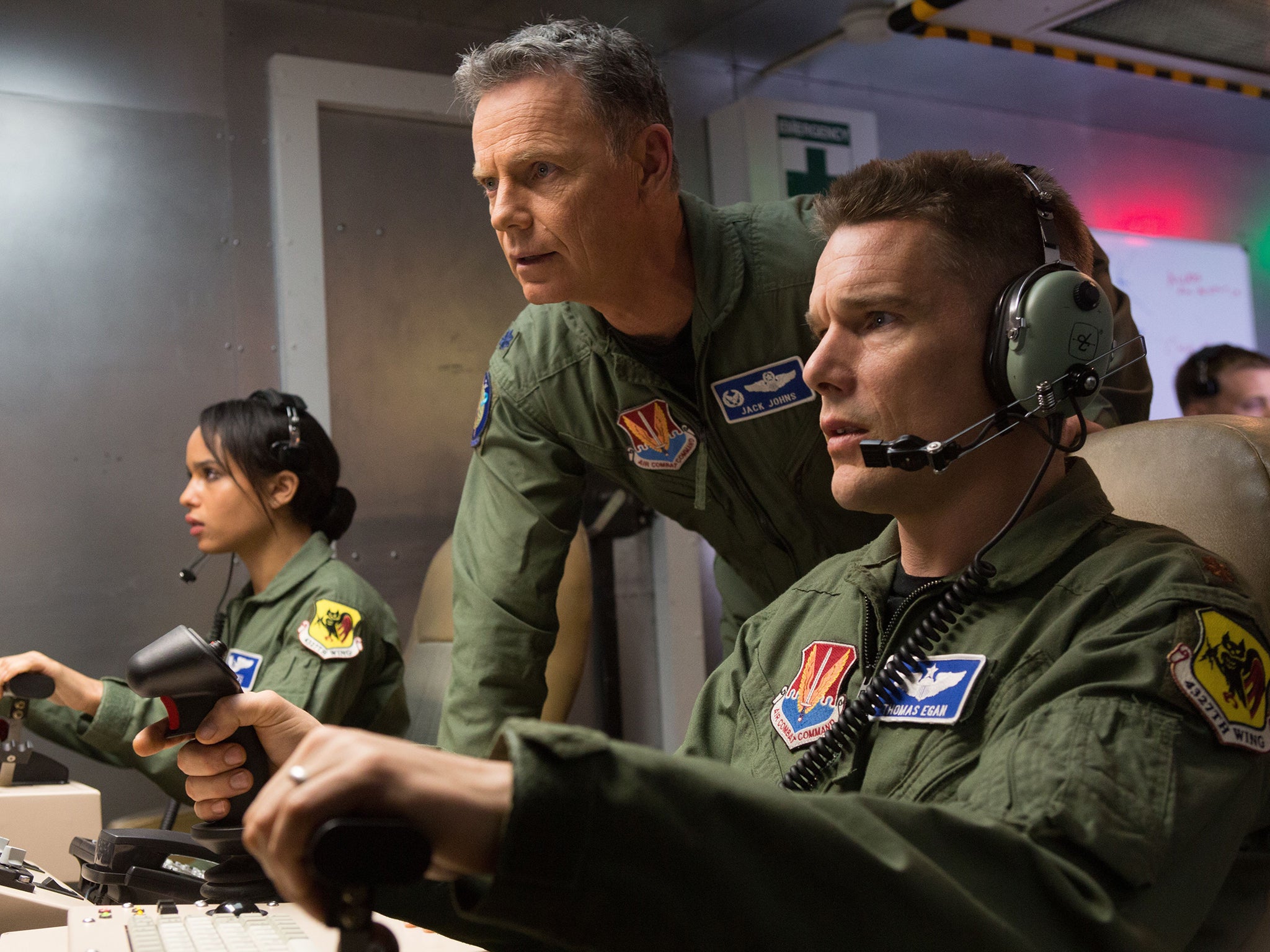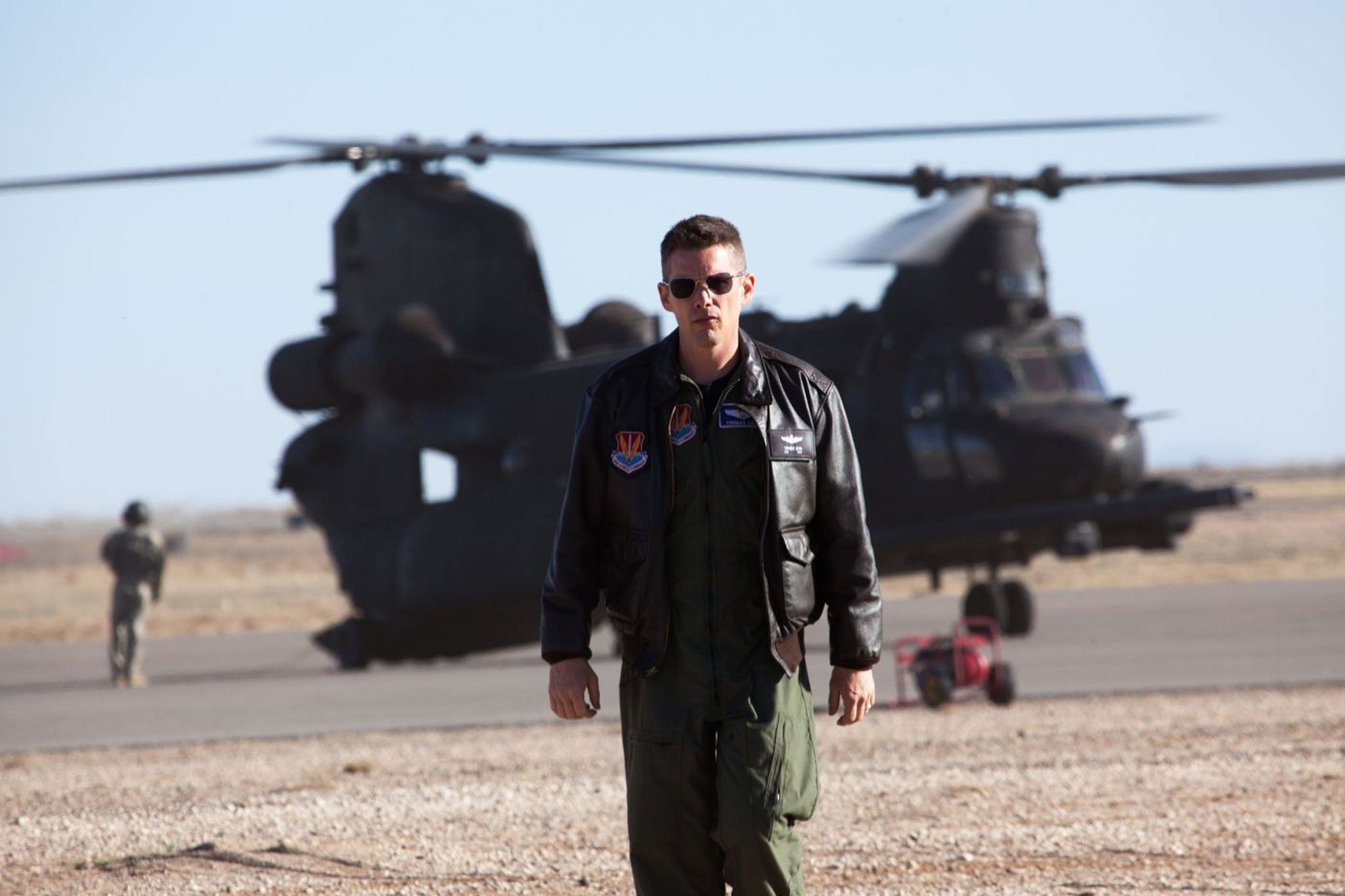Good Kill, film review: Bombs and barbecues for Ethan Hawke in the Las Vegas drone zone
(15) Andrew Niccol, 102 mins Starring: Ethan Hawke, January Jones, Bruce Greenwood

Your support helps us to tell the story
From reproductive rights to climate change to Big Tech, The Independent is on the ground when the story is developing. Whether it's investigating the financials of Elon Musk's pro-Trump PAC or producing our latest documentary, 'The A Word', which shines a light on the American women fighting for reproductive rights, we know how important it is to parse out the facts from the messaging.
At such a critical moment in US history, we need reporters on the ground. Your donation allows us to keep sending journalists to speak to both sides of the story.
The Independent is trusted by Americans across the entire political spectrum. And unlike many other quality news outlets, we choose not to lock Americans out of our reporting and analysis with paywalls. We believe quality journalism should be available to everyone, paid for by those who can afford it.
Your support makes all the difference.Disregarding Mafia films and Tim Burton's Mars Attacks!, Good Kill is almost certainly the first war movie set in Las Vegas. The weapons of battle here aren't swords or machine guns but the computer controllers used by military personnel in the steel containers ("sweatboxes") from which they operate "drones". Their targets are thousands of miles away in Afghanistan, Pakistan or Yemen. They see their enemies appear on screen like pixelated figures in a game of Call of Duty, line up their sights and press the button; then, eight to 10 seconds later, comes the "splash".
Traditional Hollywood war movies had square-jawed heroes such as Gary Cooper or John Wayne in the heat of battle. Even Kathryn Bigelow's Oscar-winner The Hurt Locker (2008) featured bomb-disposal experts on the frontline. Here, the US military protagonists are a "bunch of gamers", sitting in front of screens in what appear to be shipping containers in the Nevada Desert.
"I blew away six Taliban and now I am going home to barbecue," says Major Thomas Egan (Ethan Hawke), summing up a typical day in the life of a soldier fighting the war on terror using the new technology. He lives in the suburbs with his family and leads what appears to be a boring, routine existence – with the proviso that his job requires him to blow up people.
The writer-director Andrew Niccol likes hyperbole. He was responsible for the flashy Lord of War (2005), in which Nic Cage played a character based on the real-life Russian arms dealer Viktor Bout as if he was a modern-day Scarface. In its way, Good Kill is just as showy and self-conscious a piece of film-making. Certain lines, especially those uttered by the commanding officer Jack Johns (Bruce Greenwood), are from the Colonel Kilgore school of bullshit bravado. "Don't ask me if it's a just war. It's just war" and "nothing explodes like explosives" are among his nuggets of wisdom.
In one way, Niccol's strategy makes sense. This is a story in which all the actual bloodshed and action takes place a long way away – so it needs souping up. There isn't much overt drama in a group of young men and women operating computer systems. Niccol emphasises the struggles the troubled "hero" Egan faces in "compartmentalising" his job and his private life. Egan is a trained pilot with several tours of duty behind him, not just a gamer. He yearns to be back in a proper airplane. "I miss the fear," he admits.
Egan doesn't sleep well. He is moody and sometimes aggressive. His wife, Molly (January Jones, from Mad Men, in a fairly thankless supporting role), can't get through to him. What is not clear is whether his angst is the result of post-traumatic stress or his alienation from his new work and feelings of shame. "Every day, I feel like a coward taking potshots at somebody halfway round the world," he laments in a moment of self-pity. Egan wants to walk away but he has a mortgage to pay and a family to keep together.
Good Kill is a strange film to watch. It sometimes has the feel of a "real" war film. Egan's colleagues may be glorified gamers but they behave with the same posturing machismo as the renegades in The Dirty Dozen. That's why the base is such an uncomfortable place for young female recruit Vera Suarez (Zoë Kravitz). "Was that a war crime, sir?" she plaintively asks after the latest remotely controlled execution. At the same time, there is something detached, even surrealistic about their daily routine.
As in Richard Linklater's Boyhood and Before Midnight, Hawke excels at playing a conflicted family figure – a decent man who cannot reconcile the contradictions in his life. Take away the military trappings and the film would still just about work as a study of someone working long hours in a soulless, dehumanising job. There is the same Orwellian feel as The Truman Show, which Niccol also scripted. Hawke is quieter and more dour than he was playing the husbands and fathers in Linklater's films. However, he is very effective at capturing his character's pent-up frustration, self-disgust and mounting aggression.

There is a macabre, voyeuristic fascination in watching the drone "pilots" in action, peering in on the lives of their targets and dispensing justice from on high. Once they begin to take orders from the CIA in Langley, their rules for choosing who to kill become looser. A disembodied, Big Brother-like voice (provided by Peter Coyote) orders them to shoot "not on suspicion of guilt" but on "pattern of behaviour".
Niccol's screenplay lays bare the twisted logic and convoluted syntax of America's "war on terror". In one sub-plot, we see the drone operators grow ever more upset at the behaviour of a low-level "enemy insurgent" who assaults and rapes a woman. He is not an "official" target and they are not allowed to intervene. Their bosses, though, have no qualms about getting them to bomb compounds where women and children may be present, or to target funerals of the assailants they've already assassinated.
Good Kill is as wayward in some of its plotting as the pilots are in their strikes. It's a film that is continually shifting identity. One moment, it seems to be an anti-war movie. The next, it turns into an intense psycho-drama about an individual whose life is coming apart. Niccol doesn't always balance the thriller elements with the film's political agenda. Sometimes, for example, when we cut from the Nevada desert to that of Yemen, the storytelling seems a little glib. Nonetheless, Good Kill is successful in showing both the bizarre nature of drone warfare and in making the point that the drone pilots can't bomb with impunity. This isn't a computer game: their actions have consequences for their own lives as well as of those they target in such brutal fashion.
Join our commenting forum
Join thought-provoking conversations, follow other Independent readers and see their replies
Comments